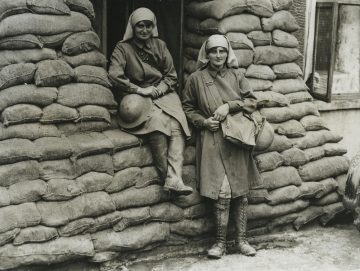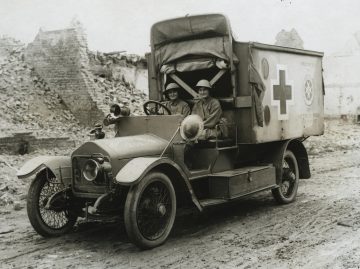By Krisztina Laszlo, Archivist, Rare Books and Special Collections
“To know even one life has breathed easier because you have lived; that is to have succeeded.” — Ralph Waldo Emerson
Every evening at 7:00 pm Vancouverites head to their windows and balconies to cheer, clap, ring bells, bang pot lids together, and make noise in appreciation for the work of our health care professionals and other essential workers. The effort in my neighbourhood (Mount Pleasant) might not equal the incredible volume from the West End, but we do well considering we do not have the same population density. There is someone on my block with a saxophone, who plays every night and I am certain there are also cowbells in the distance.
This outpouring of support and love for the brave women and men on the front lines of the COVID-19 response often brings tears to my eyes. It reminds me of the many nurses and care aids I have encountered through my life. The ones who looked after my mom with kindness and compassion through the last years of her life, of my mother who spent time as a nurse’s aid when she was a young refugee in Victoria, and the retired nurses I’ve worked with who keep up the British Columbia History of Nursing Archives. I am astounded and humbled by the work done by all of these incredible people past and present, and I am grateful beyond any way I can express with words for their continued and sustained efforts during the present crisis.
As an archivist, I wonder how I can positively contribute to the current situation. My role is to preserve evidence from the past, and to ensure it is accessible to future generations. Like most of my colleagues across Canada, I am working from home, social distancing, washing my hands, and engaging in all the other steps necessary to slow the spread of COVID-19 and protect the vulnerable around us. In light of current events and the focus on medical aid, I thought this would be an appropriate time to shine a spotlight on our historic documents relating to health care, and particularly on the nursing profession.
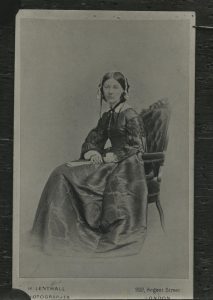
Photograph of Florence Nightingale Portrait. RBSC-ARC-1734-01-089-BC-2166-06.
Although the practice of nursing has been with us for centuries and remained predominantly female up to the current era, prior to this women were expected to tend only to members of their families. White upper middle class women did not care for the sick, dying or invalid strangers. It was in this context that Florence Nightingale, the most well known nurse of all, emerged. Nightingale defied her social standing as a wealthy daughter of a notable British family to advocate for, and create, Nursing as a profession for educated women based on the scientific principles of the day. At a time when women had few career options, this was a radical undertaking. Nightingale was able to put her theories into practice during the Crimean war (1853 – 1856), and with her success tending wounded soldiers the Nursing profession was firmly established.
For a detailed history of nursing see: https://www.britannica.com/science/nursing#ref36766
Rare Books and Special Collections is lucky to have a small cache of 88 letters written by Nightingale after her time tending the wounded of the Crimean War, and over a 100 received by her. The letters are digitized and available online for all to read and enjoy the words of this astounding woman. She made a commitment to help the wounded, and to training women to take up this work, a legacy we now celebrate daily.
https://open.library.ubc.ca/collections/florence
http://rbscarchives.library.ubc.ca/index.php/florence-nightingale-letters-collection
A compatriot, and close friend, of Nightingale is Sister Mary Gonzaga (Georgina Barrie), a Sister of Mercy from Bermondsey, England. She accompanied Nightingale to Crimea to nurse sick and wounded British soldiers as one of the Catholic nuns who volunteered for the mission and was unpaid for her work. Nightingale nicknamed her “Cardinal” in her letters, and Barrie’s nickname for Nightingale was “Pope.” Of her letters at UBC, 15 are written approximately a month apart during the war and discuss conditions in Crimea and request various supplies and items. After the Crimean War, Barrie founded the Hospital of Saint Elizabeth for Incurables in London in 1856.
http://rbscarchives.library.ubc.ca/index.php/sister-mary-gonzaga-georgiana-barrie-collection
- Sandbags instead of handbags – Lady ambulance drivers in France. RBSC-ARC-1636-BC-1763-0550.
- Lady ambulance drivers passing through a French village. RBSC-ARC-1636-BC-1763-0548.
Moving into the Twentieth Century, we house letters written by Martha May Beardmore (née Wilson), who was an English nurse who aided the British during World War I. In 1914, when Britain declared war on Germany. Beardmore settled her affairs in Regina and moved back to England to join the Queen Alexandra’s Imperial Military Nursing Service. As part of the Military Nursing Service, she aided efforts in France and the Balkan countries. Allegedly, she also ended up in the Palace of the Tsar of Russia and became a nurse to Grigori Rasputin. She ended up moving to France and then Belgium where she worked under noted nurse Edith Cavell. Our World War 1 British Press Photo collection contains images of nurses serving in France, which gives a sense of the conditions that Beardmore would have worked in.
http://rbscarchives.library.ubc.ca/index.php/martha-may-beardmore-collection
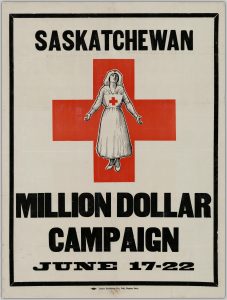
Saskatchewan million dollar campaign, June 17, 1922. SPAM461C.
Representing nursing during the Second World War is a photograph album compiled by Katherine Watson Emery, who was born in New Brunswick Canada in 1900. She moved to Vancouver, where she trained as a nurse. In 1944, she went into overseas service with the St. John Ambulance Brigade of Canada to tend to wounded during World War 2. She returned to Canada on September 25th 1945. The records document Emery’s service as a nurse during World-War 2, as well as her experiences of World-War 1, and her life and career as a nurse in Vancouver and New Brunswick.
http://rbscarchives.library.ubc.ca/index.php/katherine-emery-fonds
Not all of our nursing archives relate to wartime experiences, but also focus on practice in British Columbia. Mabel Clara Taylor was born in Eccleshall, England on the 1st of March 1891 to parents Joseph and Elizabeth Taylor. In her youth, she immigrated to Vancouver, British Columbia, where she studied nursing. In February of 1923, she graduated with a diploma in nursing from Vancouver General Hospital. Over the next three decades, she worked at various hospitals including the Prince Rupert General Hospital, the Essondale Mental Hospital, the Abbotsford General Hospital, the Mission Memorial Hospital, the Miller Bay Indian Hospital, the Royal Jubilee Hospital, the Oak Lodge Private Hospital, the Terrace Red Cross Outpost Hospital, the Children’s Hospital and the Nanaimo Indian Hospital.
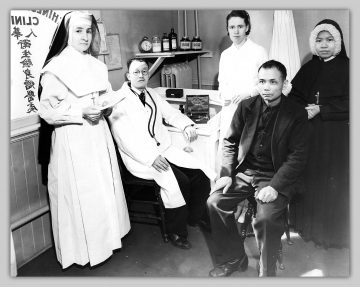
[Chinese hospital clinic]. CC-PH-10640.
http://rbscarchives.library.ubc.ca/index.php/mabel-clara-taylor-fonds
Since 2019, Rare Books and Special Collections has been working with the British Columbia History of Nursing Society (BCHNS) on an exciting project to transfer their archival collections to the UBC Library. The BCHNS houses an extensive archive of nursing history in British Columbia, including records of individual nurses and nursing groups and associations. These materials cover the entire history of the profession in this province, including the development of nursing education and training. The archive is unparalleled in its coverage of this topic, and extensive in scope (it includes 22 meters of textual records, 270 audio recordings of oral histories, and more). We were weeks away from physically transferring the materials to RBSC when UBC switched to remote work due to COVID-19. When we return to campus, this acquisition will be a priority, especially considering the interest in this area engendered by the current focus on healthcare work.
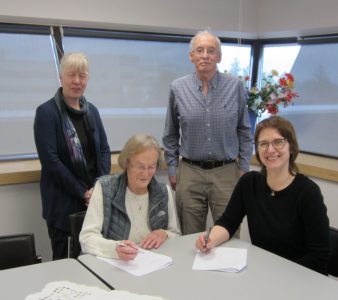
Nan Martin, BCHNS Chair of Succession Planning Task Group, and Krisztina Laszlo, Archivist, RBSC at official signing of agreement to transfer the BCHNS Archives to UBC Library on January 24, 2020. Francis Mansbridge, BCHNS Archivist, and Geertje Boschma of the UBC School of Nursing as witnesses.
“I attribute my success to this; I never gave nor took any excuse.” — Florence Nightingale
While the Rare Books and Special Collections reading room is currently closed, researchers interested in nursing history can access additional digitized content held by the UBC Library here: https://open.library.ubc.ca/collections/historyofnursinginpacificcanada
Please check the UBC Library homepage and the Rare Books and Special Collections homepage for future updates about reading room operations.
